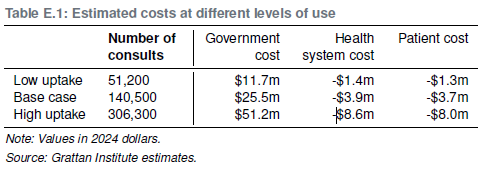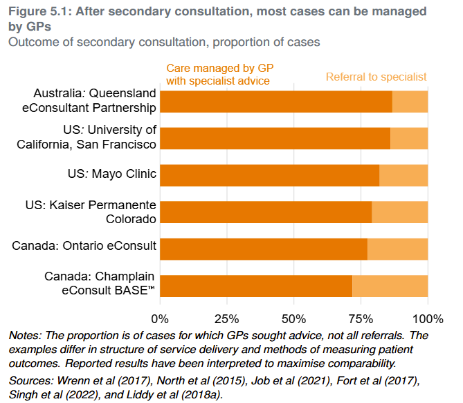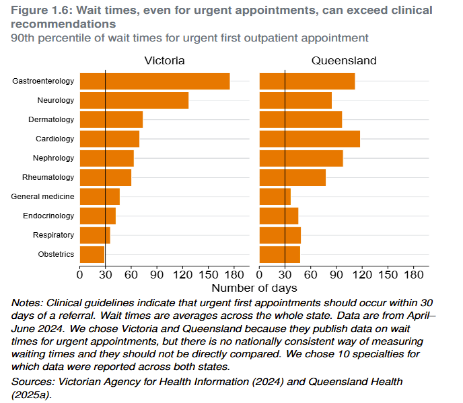Posted on 27 Jun, 2025 in
Grattan report calls for a national secondary consultation system to cut specialist waiting times.
Australia’s hospital waiting lists are growing, and too many patients are waiting months for a specialist appointment that may not even be necessary. A Grattan Institute report, Special Treatment, makes a clear recommendation: create a national “secondary consultation” system so that primary care providers can obtain rapid, written advice from hospital specialists before sending a patient for a face-to-face visit. This approach—already proven in Canada, the United States and parts of Australia—can reduce unnecessary referrals, help GPs and other primary care providers manage more patients in the community, and direct those who do need a specialist to the right service sooner.
What is a secondary consultation?
A secondary consultation is a secure, digital exchange between a primary care provider (PCP) and a hospital specialist. It is also known as eConsultation or Advice and Guidance. The PCP submits a focused clinical question with relevant results, and the specialist provides advice—usually within a few business days—without the patient needing to attend an appointment.
The Grattan report argues that these consultations should be digital and asynchronous so they fit into busy clinical workflows. They should be broad in scope so clinicians always know where to turn, fully funded with payments for both the PCP and specialists and no cost to patients, and quality-assured with minimum specialist credentials, turnaround standards and feedback surveys.
The numbers behind the recommendations
The report models a base case of 140,500 secondary consultations per year. With that level of use, the system is expected to avoid around 68,000 unnecessary specialist referrals each year, freeing up appointment slots for patients who truly need them. At the same time it would generate about 4,700 additional referrals that might otherwise be missed, catching patients who require specialist input.
The cost of secondary consultation will change depending on uptake. Table E.1 in the report outlines the estimated costs at three different levels of use.

Lessons from overseas
International examples show the promise of this approach. Canada’s Champlain eConsult BASE™ enables GPs to seek advice from specialists across dozens of disciplines, with up to 60 per cent of planned referrals managed entirely in primary care and response times typically within a week. Similar models in the United States have demonstrated reductions in wait times and high GP satisfaction.
The Grattan report draws on these results to demonstrate the potential scale of impact in Australia and to show that digital specialist advice is safe, cost-effective and popular with both patients and clinicians. Figure 5.1 in the report summarises some of the key evidence from existing secondary consultation models.

Why this matters for Australia
Even people with an urgent referral to a specialist can face monthslong waits (Figure 1.6 from the Report). In Victoria and Queensland, one in 10 people with an urgent referral for many specialties wait much longer than the clinically recommended 30 days.
By giving GPs and other PCPs timely specialist input, a national secondary consultation service could reduce pressure on public hospital outpatient clinics, shorten waits for patients who do need specialist care, and improve continuity and convenience for patients who can be managed safely by their PCP.
The report emphasises that secondary consultation is a modest investment compared to the scale of outpatient spending. More importantly, it highlights that this reform is not just about costs—it is about designing referral pathways that allow patients to receive the right care at the right time, without unnecessary delays or travel.

The takeaway
The Grattan Institute concludes that a national secondary consultation system would be cost-effective, reduce unnecessary referrals, and speed up access to specialist care. The modelling shows it would also save patients significant out-of-pocket costs. For health services, technology providers and policymakers, the message is clear: a carefully designed digital consultation platform is a practical, evidence-based reform that can strengthen primary care and relieve hospital pressure.
Read the full report Special Treatment: Improving Australians’ access to specialist care here: Special treatment: Improving Australians’ access to specialist care – Grattan Institute